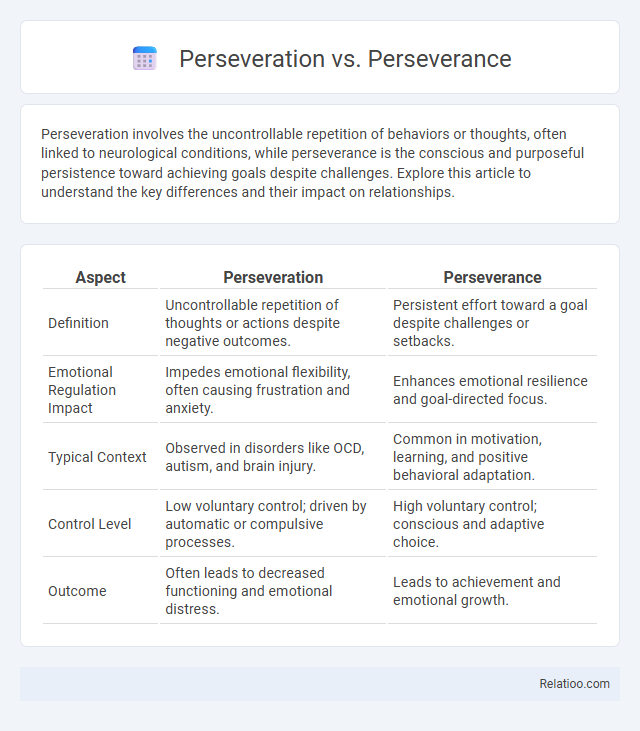Perseveration involves the uncontrollable repetition of behaviors or thoughts, often linked to neurological conditions, while perseverance is the conscious and purposeful persistence toward achieving goals despite challenges. Explore this article to understand the key differences and their impact on relationships.
Table of Comparison
| Aspect | Perseveration | Perseverance |
|---|---|---|
| Definition | Uncontrollable repetition of thoughts or actions despite negative outcomes. | Persistent effort toward a goal despite challenges or setbacks. |
| Emotional Regulation Impact | Impedes emotional flexibility, often causing frustration and anxiety. | Enhances emotional resilience and goal-directed focus. |
| Typical Context | Observed in disorders like OCD, autism, and brain injury. | Common in motivation, learning, and positive behavioral adaptation. |
| Control Level | Low voluntary control; driven by automatic or compulsive processes. | High voluntary control; conscious and adaptive choice. |
| Outcome | Often leads to decreased functioning and emotional distress. | Leads to achievement and emotional growth. |
Introduction to Perseveration and Perseverance
Perseveration refers to the repetitive continuation of a particular response or behavior, often observed in neurological or psychological conditions, where an individual cannot switch to a new task or thought. Perseverance signifies the intentional and persistent effort to achieve a goal despite obstacles or delays, highlighting resilience and determination. Understanding the distinction between perseveration and perseverance is essential for recognizing whether repeated behavior stems from cognitive rigidity or deliberate persistence in goal pursuit.
Defining Perseveration: Meaning and Examples
Perseveration refers to the repetitive, uncontrollable repetition of a word, phrase, or gesture, often seen in neurological conditions such as autism or brain injury. Unlike perseverance, which is the quality of steadfastness and determination in pursuing goals, perseveration is a symptom indicating difficulty in shifting focus or adapting behavior. Understanding perseveration helps you recognize patterns that may impact communication and cognitive flexibility, with examples including repeatedly saying the same phrase despite changes in conversation.
What is Perseverance? Key Characteristics
Perseverance is the focused and sustained effort to achieve long-term goals despite obstacles or difficulties. Key characteristics include resilience, determination, and consistent motivation to overcome challenges through persistent action. Unlike perseveration, which involves repetitive behavior or thoughts often linked to neurological conditions, perseverance reflects adaptive and purposeful persistence.
Psychological Origins of Perseveration
Perseveration, rooted in neurological conditions such as brain injury or autism, involves the uncontrollable repetition of a response or behavior despite changes in context, distinguishing it sharply from perseverance, which reflects your motivated and goal-driven persistence. Psychological origins of perseveration trace back to dysfunction in the frontal lobe, impairing cognitive flexibility and the ability to shift mental sets. Understanding these neuropsychological mechanisms can help differentiate perseveration from perseverance for effective behavioral interventions.
The Role of Perseverance in Personal Growth
Perseverance drives personal growth by enabling you to overcome obstacles and maintain focus on long-term goals despite setbacks. Unlike perseveration, which involves repetitive, unproductive behavior often linked to cognitive conditions, perseverance fosters adaptive resilience and continuous self-improvement. Your consistent effort and determination contribute to skill development, emotional strength, and achievement over time.
Differences Between Perseveration and Perseverance
Perseveration refers to the repetitive continuation of a behavior or response, often seen in neurological conditions, while perseverance denotes persistent effort towards a goal despite obstacles. The key difference lies in intention and outcome: perseverance is a positive, goal-driven trait, whereas perseveration is typically an involuntary, maladaptive behavior. Understanding this distinction helps in clinical diagnosis and in fostering resilience versus addressing cognitive impairments.
Positive Outcomes of Perseverance
Perseverance drives sustained effort and determination despite challenges, leading to significant achievements and personal growth. Positive outcomes of perseverance include enhanced problem-solving skills, increased resilience, and the ability to reach long-term goals. Unlike perseveration, which involves repetitive and unproductive behaviors often linked to neurological conditions, perseverance fosters adaptive success and motivation.
Negative Impacts of Perseveration
Perseveration refers to the uncontrollable repetition of a particular response or behavior, often seen in neurological or psychological conditions, which can significantly impair your ability to adapt and respond flexibly to changing situations. Unlike perseverance, which is a positive trait involving steadfastness toward goals, perseveration leads to cognitive rigidity, frustration, and social challenges due to repetitive and inappropriate behaviors or thoughts. This negative impact of perseveration can hinder learning, problem-solving, and effective communication, especially in individuals with autism spectrum disorder or brain injuries.
Strategies to Overcome Perseveration
Strategies to overcome perseveration include cognitive-behavioral therapy (CBT) techniques, which help redirect repetitive thoughts through mindfulness and grounding exercises. You can improve focus by breaking tasks into smaller, manageable steps to reduce mental fixation and increase task completion. Employing visual aids and routine adjustments also supports cognitive flexibility, minimizing perseverative behaviors effectively.
Cultivating Healthy Perseverance in Daily Life
Cultivating healthy perseverance involves maintaining consistent effort toward goals despite challenges, distinguishing it from perseveration, which is repetitive and often unproductive behavior linked to neurological conditions. Your ability to focus on adaptive strategies and set realistic milestones enhances resilience and promotes sustained motivation. Building this skill supports mental well-being and success by fostering productive persistence rather than rigid, repetitive fixation.

Infographic: Perseveration vs Perseverance
 relatioo.com
relatioo.com